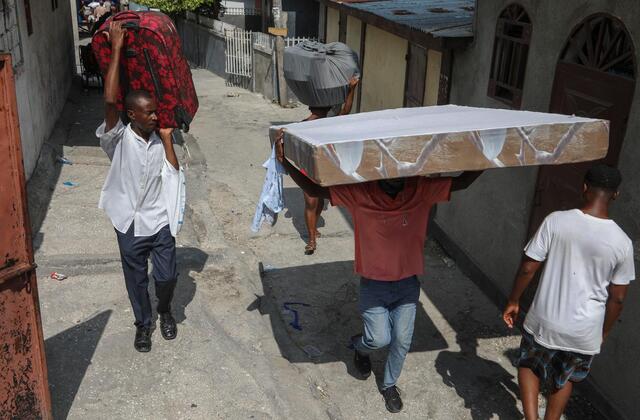Panic, displacement in Haiti’s capital as gangs step up attacks
3 min read
Residents flee their homes to escape gang violence in the Nazon neighborhood of Port-au-Prince, Haiti, Thursday, Nov. 14, 2024. (AP Photo/Odelyn Joseph)

Residents flee their homes to escape gang violence in the Nazon neighborhood of Port-au-Prince, Haiti, Thursday, Nov. 14, 2024. (AP Photo/Odelyn Joseph)
The residents of Solino, a neighborhood in the Haitian capital of Port-au-Prince, are grappling with an increasing wave of violence as gangs have intensified their attacks, forcing many families to flee their homes. This surge in violence has left locals uncertain about where to seek refuge, compounding the challenges of an already chaotic situation in the capital.
Solino, which had previously remained relatively unaffected by gang control, is now at the center of one of the most dangerous hotspots in Port-au-Prince. The escalating violence is a result of heightened gang activity following the political instability caused by the recent firing of Haiti’s interim prime minister. The country has been struggling with political gridlock and corruption allegations against members of a transitional council that was created with the aim of restoring democratic order. However, the political infighting has only deepened the crisis, allowing criminal gangs to seize more territory and further disrupt daily life.
Many residents of Solino are now displaced, packing their belongings and fleeing the area in fear of their lives. One woman, who fled to temporary shelter within Port-au-Prince, expressed her concerns that even the temporary shelters may not be safe for long. “We are not sure where to go. If we find a safe place today, it might not be safe tomorrow,” she said, speaking on the uncertainty of living amidst such rampant violence.
The worsening security situation has left the people of Haiti in a state of constant anxiety. With no elections held since 2016 due to the escalating gang violence, the people of Haiti are trapped in a cycle of political instability and lawlessness. Gangs like the Viv Ansanm coalition have been known to exploit political turmoil to strengthen their hold over neighborhoods and increase their power. In Solino, they have taken advantage of the power vacuum created by the government’s lack of authority and have begun to terrorize the local population.
The impact of gang violence has reached beyond the streets of the capital. Last Monday, gangs targeted Haiti’s main international airport, shutting down operations by shooting at planes. One flight attendant was wounded during the attack. This further destabilized the country and highlighted the extent to which gangs have infiltrated all aspects of life in Haiti.
The United Nations (UN) has expressed concern over the spiraling violence. In one day alone, the UN documented 20 armed clashes in Port-au-Prince, underscoring the increasingly lawless environment in the capital. According to UN estimates, gangs now control approximately 85% of the city, a staggering figure that illustrates the extent of their dominance. This control over such a significant portion of the capital has made it nearly impossible for citizens to feel safe in their own neighborhoods.
As the situation in Port-au-Prince continues to deteriorate, many are left wondering what will happen next for the residents of the capital. With no clear path to political stability or security, the people of Haiti are caught in a desperate struggle for survival. The violence has forced thousands to flee their homes, and even those who manage to find temporary shelter live in constant fear that their refuge will soon be overtaken by gangs.
The international community, including the United Nations, has called for greater efforts to address the crisis, but the challenges of providing security and stability in Haiti remain immense. Until a solution is found to address the root causes of the violence—political corruption, gang control, and the absence of functioning government institutions—the people of Haiti will continue to face the daily threat of violence and displacement.
As the gang violence escalates and more neighborhoods fall under their control, the people of Port-au-Prince are left searching for hope. But with the country’s leadership in disarray and its security forces overwhelmed, the road to peace and stability seems as distant as ever. For now, the people of Haiti are left to navigate the chaos, uncertain of where they can find safety or when the violence will finally subside.